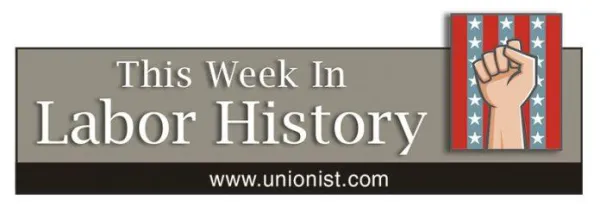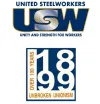This week in labor history: November 14-20

NOVEMBER 14
1903 – Women’s Trade Union League founded in Boston.
1934 – The American Railway Supervisors Association is formed at Harmony Hall in Chicago by 29 supervisors working for the Chicago & North Western Railway. They organized after realizing that those railroaders working under their supervision already had the benefits of unionization and were paid more for working fewer hours.
1934 – The Depression-era Public Works Administration agrees with New York City today to begin a huge slum clearance project covering 20 acres in Brooklyn, where low-cost housing for 2,500 families will be completed. It was the first of many such jobs-and-housing projects across the country.
1938 – The National Federation of Telephone Workers — later to become the Communications Workers of America — is founded in New Orleans.
1978 – Jimmy Carter-era OSHA publishes standard reducing permissible exposure of lead, protecting 835,000 workers from damage to nervous, urinary and reproductive systems.
1979 – The Federation of Professional Athletes granted a charter by the AFL-CIO.
NOVEMBER 15
1881 – The founding convention of the Federation of Trades and Labor Unions is held in Pittsburgh. It urges enactment of employer liability, compulsory education, uniform apprenticeship and child and convict Labor laws. Five years later it changes its name to the American Federation of Labor.
NOVEMBER 16
1927 – A county judge in Punxsutawney, Pa., grants an injunction requested by the Clearfield Bituminous Coal Co. forbidding strikers from speaking to strikebreakers, posting signs declaring a strike is in progress, or even singing hymns. Union leaders termed the injunction “drastic.”
1982 – The National Football League Players Association ends a 57-day strike that shortened the season to nine games. The players wanted a higher share of gross team revenues but failed to win it until many years later.
NOVEMBER 17
1785 – The General Society of Mechanics and Tradesmen of the City of New York is founded “to provide cultural, educational and social services to families of skilled craftsmen.” The Society remains in existence to this day.
1900 – Martin Irons dies near Waco, Texas. Born in Dundee, Scotland, he emigrated to the U.S. at age 14. He joined the Knights of Labor and in 1886 led a strike of 200,000 workers against the Jay Gould-owned Union Pacific and Missouri railroads. The strike was crushed, Irons was blacklisted and he died broken down and penniless. Said Mother Jones: “The capitalist class hounded him as if he had been a wild beast.”
1916 – To the huge relief of Post Office Department employees, the service sets a limit of 200 pounds a day to be shipped by any one customer. Builders were finding it cheaper to send supplies via post than via wagon freight. In one instance, 80,000 bricks for a new bank were shipped by parcel post from Salt Lake City to Vernal, Utah, 170 miles away. The new directive also barred the shipment of humans after a child involved in a couple’s custody fight was shipped — for 17 cents — from Stillwell to South Bend, Ind., in a crate labeled “live baby.”
1947 – With many U.S. political leaders gripped by fear of communism and questioning citizen loyalties in the years following World War II, the Screen Actors Guild votes to force its officers to take a “non-communist” pledge. A few days earlier the Hollywood Ten had been called before the House Committee on Un-American Activities.
NOVEMBER 18
1919 – Seattle printers refuse to print anti-Labor ad in newspaper.
1958 – Thirty-one men died on Lake Michigan with the sinking of the Carl D. Bradley during one of the worst storms in the lake’s history. The 623-foot ship, carrying limestone, broke in two. Only four crewmen survived.
NOVEMBER 19
1915 – Joe Hill, Labor leader and songwriter, executed in Utah on what many believe was a framed charge of murder. Before he died he declared: “Don’t waste any time mourning. Organize.”
1954 – The nation’s first automatic toll collection machine is used at the Union Toll Plaza on New Jersey’s Garden State Parkway.
1981 – The National Writers Union is founded, representing freelance and contract writers and others in the trade. In 1992 it was to merge into and become a local of the United Auto Workers.
NOVEMBER 20
1816 – First use of the term “scab,” by Albany Typographical Society.
1888 – The time clock is invented by Willard Bundy, a jeweler in Auburn, N.Y. Bundy’s brother Harlow starts mass producing them a year later.
1901 – Mine fire in Telluride, Colo., kills 28 miners, prompts union call for safer work conditions.
1968 – A total of 78 miners are killed in an explosion at the Consolidated Coal Company’s No. 9 mine in Farmington, W. Va.
2008 – The Great Recession hits high gear when the stock market falls to its lowest level since 1997. Adding to the mess: a burst housing bubble and total incompetence and greed — some of it criminal — on the part of the nation’s largest banks and Wall Street investment firms. Officially, the recession lasted from December 2007 to June 2009, but unemployment still hovers around the seven percent mark today.
(Compiled by David Prosten, founder of Union Communication Services)
- Share this story:
